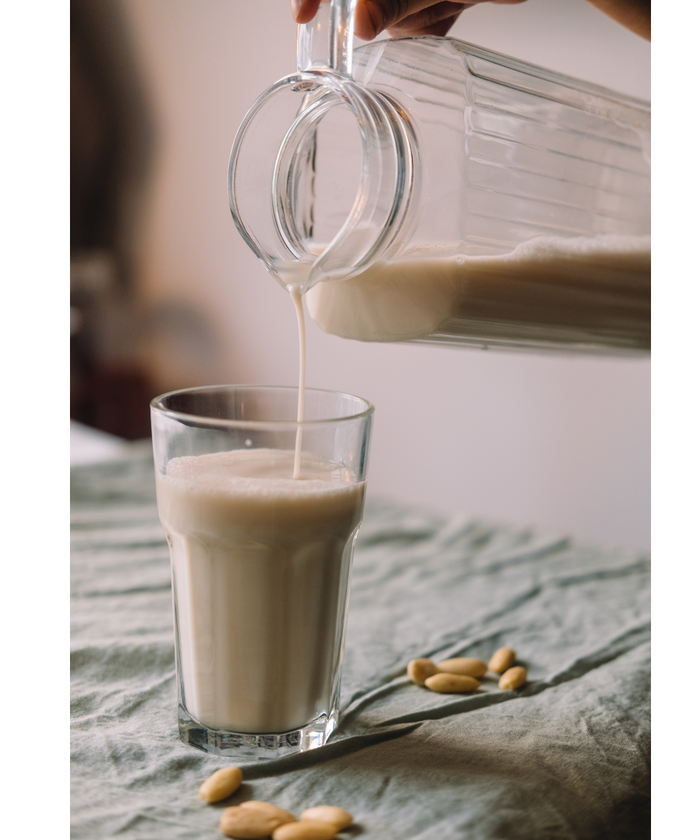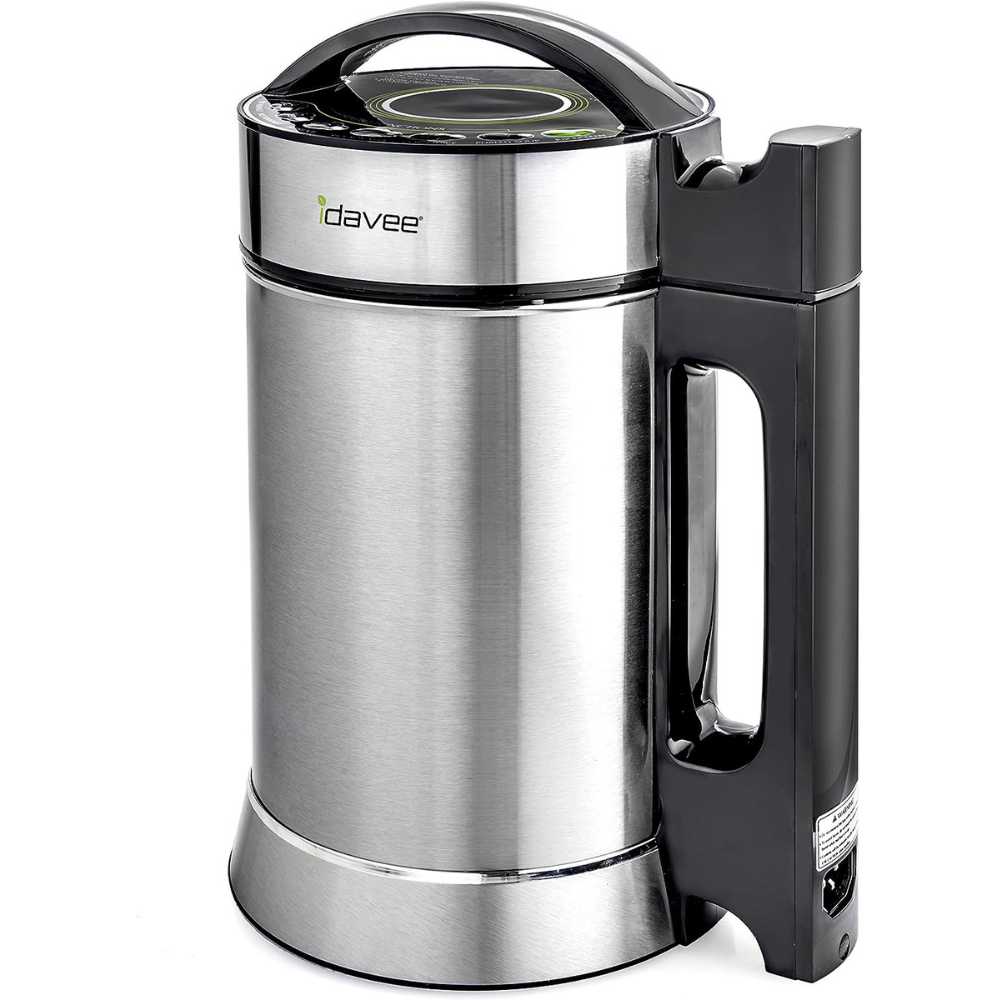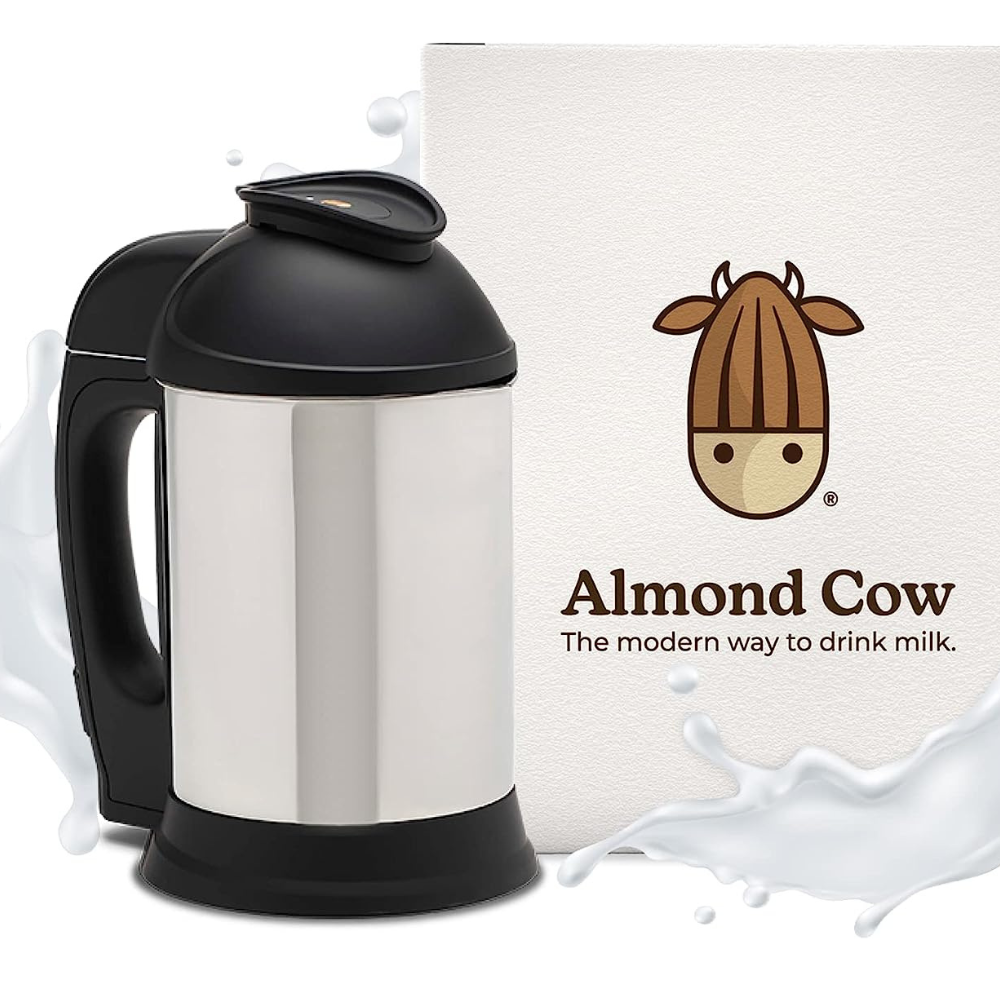Are you on a mission to find the absolute BEST nut milk maker? If so, you’re in luck!
RadishRoses has done all the heavy lifting for you and put together all the information you need plus a comprehensive review of top-rated machines.
We’ll provide our suggestions for the best nut milk makers and give an in-depth look at many of the best models available today, including their features, advantages and disadvantages.
Whether your budget or your family is big or small there's sure to be something here that fits your needs perfectly.
So, let’s dive into our review of the BEST Nut Milk Maker and help you get started with healthy homemade non-dairy milk!
Making your own plant-based milk - a must for any health-conscious home!
Plant-based milks are becoming increasingly popular, and include soy milk, rice milk, oat milk, coconut milk, and any non-dairy milk made from nuts such as almond or cashew milk, or even walnut milk.
One of the best ways to save money and know exactly what goes into your plant-based milk is by making it at home.
Making milk at home can be done with minimal effort and you can easily customize your nut milks according to your dietary needs.
This innovative kitchen appliance allows you to easily create your own fresh, all-natural plant-based milk right at home.
Whatever ingredients you choose, you must use a quality machine for optimal results. So, let’s take a look at some of the options to find the best nut milk maker for your needs.
Our Review Process for Finding the Best Nut Milk Maker
Trying to sort through every plant-based milk maker available can be overwhelming.
You don't want to spend the money and end up having to replace it in a few months.
With every brand promoting their product, you need honest information to decide on the best nut milk maker for your family.
We've done the hard work for you and compared thousands of consumer ratings and reviews along with the various available features on several brands.
We compiled the information to create an easy-to-navigate comparison of all the best nut milk makers available today.
With our helpful guide, you'll be able to make an educated decision so you can enjoy making your own milk in no time!
Our Picks For BEST Nut Milk Maker
ChefWave Milkmade Dairy Alternative Milk Machine
What Stands Out:
Highly rated
Self-Cleaning
The Details:
- One-year warranty, money-back guarantee
- Dimensions: 15.6"D x 9.8"W x 18.5"H
- Capacity of 10 or 20-ounce (0.3 or 0.6 liter) brew capacity
- Auto Clean Function
- Delay Start Program
- Glass milk pitcher
The Downside:
- Processing container is made from plastic
- No filter/strainer
- Some reviewers say it is not best for making oat milk, others suggest using the low heat setting
Idavee Brand - 1.9 Liter Automatic Hot Soy Milk, Soup, Porridge, and Cold Juice Maker
What Stands Out:
Low Price
Small Business
The Details:
- One-year warranty, money-back guarantee
- Large 1.9-liter capacity (approximately 64 ounces)
- Dimensions: 6.75 x 9.75 x 13.75 inches
- Stainless Steel, double-layer construction
- Small Business
The Downside:
- Hand wash only
- Included pitcher and strainer are made from plastic
Almond Cow Milk Maker Machine
What Stands Out:
Large capacity
Small Business
The Details:
- Stainless steel
- Almond cow is space saving, Dimensions: 8 x 7 x 12.1 inches
- Makes 5-6 cups per batch (approx. 40-50 ounces or 1-1.5 liters)
- Easy to Use
The Downside:
- Hand wash only
- Many Almond Cow reviews indicate additional filtering is needed for desired smoothness
Questions About Nut Milk Makers - FAQs
Navigating through all the information before buying a nut milk maker can be a daunting task.
But don't worry, we're here to help!
We know that you might still have questions before committing to a purchase.
We've gathered answers to some of the most common questions about nut milk makers so you can make an informed decision before hitting that "buy" button.
Finding the right fit for you is important, and we're here to make that process a little bit easier.
So sit back, relax, and let us help make your nut milk maker dreams a reality!
q: Is making your own nut milk worth it?
a: Absolutely!
Using your own nut milk maker is not only nutritious and cost-effective, it's also an incredibly rewarding process.
Here are just a few of the many benefits of making your own alternative milk at home:
Nutrition - Homemade nut milk is packed with vitamins, minerals, and essential fatty acids that can help keep you healthy and fit.
Homemade nut milks don't contain any added preservatives or artificial flavors like store-bought versions do!
Cost-Effective - Commercial nut milks often contain fillers like starches and emulsifiers which add extra calories but don’t contribute to nutrition.
By making your own, you'll get more bang for your buck since all ingredients will be natural and you won’t need to pay for those unnecessary additives.
Plus, when processing nuts, your machine usually leaves a puree behind so you will also have homemade nut butters!
Sustainable - Making your own alternative milk helps reduce waste since it eliminates the need for pre-packaged containers found in store-bought varieties.
Investing in quality reusable bags or containers means less plastic too (an eco-friendly win!).
Enjoyable Process – Perfecting the art of creating silky smooth and creamy milk will have you feeling proud of your skill and taking care of your health.
q: How long does freshly made nut milk last?
a: Freshly made milk can easily last up to five days when stored properly.
Keep the milk covered and refrigerated, away from any sources of heat or sunlight.
To extend its shelf life even further, freeze it in an airtight container for up to three months.
When you're ready to use the frozen nut milk, defrost it slowly in a refrigerator overnight.
Never thaw at room temperature, there's a risk that any potential contaminants will grow and cause food spoilage.
It’s best not to take this chance – always defrost in a cold environment!
In addition to following proper storage instructions, make sure your nuts are fresh before beginning the process of making nut milk.
Otherwise, your end product may contain bacteria or other microbes that could contribute to spoiling if not handled with care.
Finally, just like with any food products out there on the market today, if your freshly made nut milk begins smelling sour or has a funky color change taking place (like turning greenish-yellow), don't hesitate – discard immediately!
Follow these tips and you'll be able to enjoy delicious homemade nut milks for weeks and months on end without worrying about them losing their nutritional value too soon!
q: Is it better to make milk from almonds with or without skin?
a: Whether you should make your milk with or without the almond skin is largely up to personal preference and depends on the flavor you are looking for in your recipe.
Almonds with skin result in a slightly nuttier, earthier taste while almonds without skin create a milder, sweeter flavored milk.
Additionally, using almonds with skins can lead to more bitter-tasting results due to tannins within them when blended into too small pieces so it's best to avoid blending them for too long if you want to use this method.
Furthermore, including the skins may also give your almond an opaque hue that some people don't prefer since using just peeled almonds provides a much clearer-looking liquid result.
In terms of nutritional value there won't be any considerable differences either way as both methods contain nearly identical nutrients and provide similar health benefits such as Vitamin E and Magnesium which are all important aspects of any balanced diet!
It comes down to what type of taste experience you want when using your almond milk maker.
The decision is entirely yours - happy experimenting!
q: Why is my homemade milk gritty?
a: People who use an almond milk maker usually encounter some grit in their finished product.
This is because milk from almonds is simply a mixture of ground almonds and water, so when it’s blended, you can create a texture that can be gritty.
Depending on the type of almond milk maker you are using and what kind of grinding approach you take, there are certain techniques for making smoother, less gritty milk compared to others.
The first thing to consider if your homemade milk ends up being gritty is whether or not your almonds were pre-soaked before blending them with water.
Pre-soaking helps soften the almonds before they are added into the blender which allows for more even textures after blending them with water.
So make sure to soak your almonds overnight (or at least 4 hours) in warm water before adding them into the blender with some fresh cold filtered water for best results!
The next key factor would be how effectively you blend all ingredients within a reasonable amount of time.
Even with the best almond milk maker, over-blending can cause excessive heat buildup which will lead to grainy nut milks.
Finally, consider using cheesecloth/nut milk bags which will strain out most larger particles leaving behind creamy smooth liquid, free from grit.
q: Can I freeze almond milk?
a: Absolutely!
Not only is it convenient and easy, but it can help prolong the life of your milk so you don't have to make a new batch as often.
Here’s how to do it: once you've made the milk, pour it into an airtight container (I recommend something like a mason jar).
Leave about an inch and a half of room at the top for expansion.
Label and date your container with what's inside so that you remember what kind of alternative milk you froze.
Once sealed tightly, place your containers in a freezer bag or wrap them up nicely with plastic wrap or foil before placing them in the freezer to protect them from any smells that may be lingering around and keep other items from getting contaminated by their flavor.
When ready to thaw, remove frozen containers from the freezer and thaw completely at room temperature before using (about two hours).
The milk should remain fresh in this state for about two months so long as you kept all surfaces clean during the freezing process!
If stored properly, you could save time by buying nuts in bulk and making larger batches.
q: Does almond milk spike blood sugar?
a: The simple answer is no.
Almond nut milk can help stabilize your blood sugar levels throughout the day because of its low glycemic index (GI).
The glycemic index measures how quickly different carbohydrates affect your body's glucose levels--higher GI ranks mean a food increases glucose faster than lower ranks.
Because milk from almonds only contains 1-3 grams of carbs per cup, it's considered to have a very low GI ranking between 0 to 32 (water has the lowest rating at 0 while white bread usually tops at 100).
So drinking almond milk will not cause spikes in your blood sugar like higher GI foods.
This makes milk from almonds an excellent option for diabetics as part of their healthy diet plan along with other sources of protein such as nuts, legumes, tofu and fish, which also contain slow-digesting carbohydrates that don't cause rapid spikes in glucose levels.
The calcium found in many milk brands can also be beneficial for diabetics who may have an increased risk for osteoporosis due to insulin resistance.
In addition to preventing blood sugar spikes, studies suggest that consuming almonds and related products like almond butter could even reduce them!
Research conducted by the US Department of Agriculture found that including almonds daily reduced post-meal glycemia compared to those given higher carbohydrate snacks.
Therefore those seeking nutritionally sound options should consider adding more almond milk to their diet!
Which Nut Milk Maker Is Right For You?
Congratulations on starting to make your own nut milk!
We hope that you found our article helpful and informative in helping you choose the best Nut Milk Maker for your needs.
We have given you the information to choose the right one for you, along with the top picks we think will best suit your needs.
Feel free to revisit your favorites and learn more by tapping the Amazon link listed below each item.
Thank you for joining us today, and have fun shopping for your new Nut Milk Maker!




